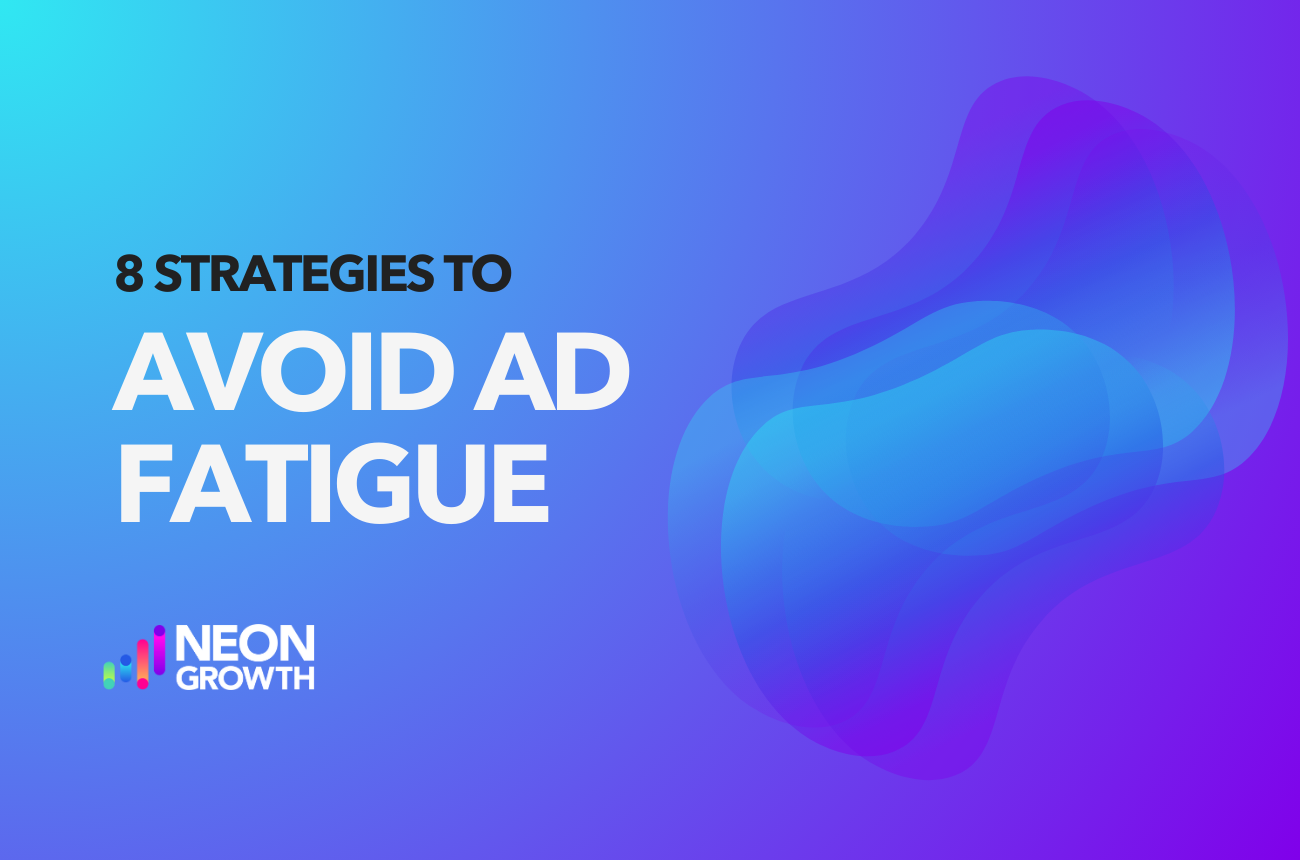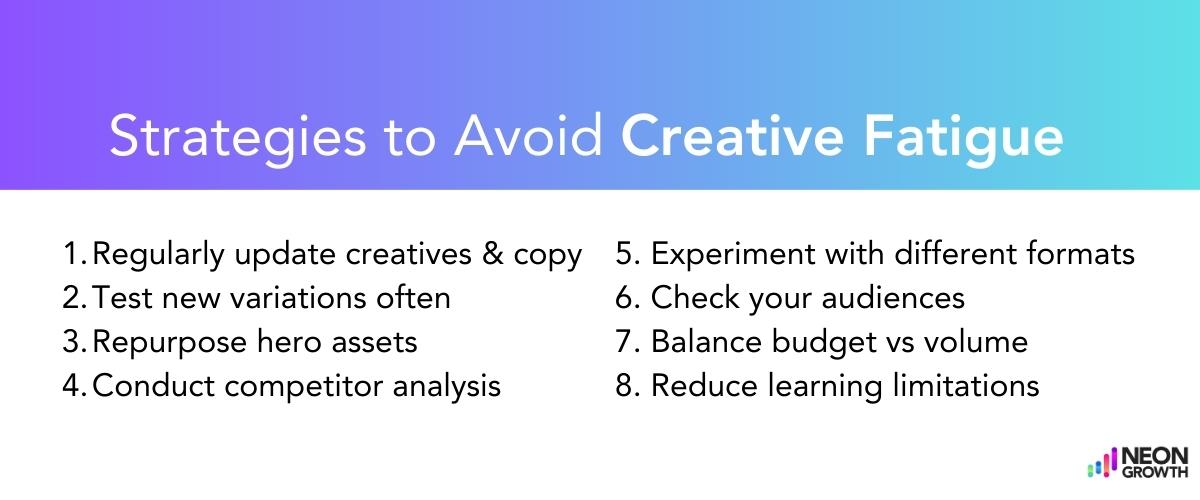Copyright Smart Link 2023. Data & Privacy
Eight Strategies to Avoid Ad Fatigue
Published on
August 16, 2023

We've already covered what ad fatigue is and how to spot it, but how do you prevent it?
Long story short, avoiding tired ads requires ongoing effort and attention to detail.
Below are 8 of our most effective strategies for avoiding creative fatigue in your ad campaigns.

1. Regularly Update Ad Creatives & Text Captions:
The best way to avoid ad fatigue is clear: regularly update the ad creatives with fresh and engaging visuals.
You don’t need to start ad sets from scratch each time. Just make sure you are cycling in a few new creative styles alongside your existing top ads. This helps ensure the ad channel serves more variety and has assets on hand to prevent fatigue.
New visuals aren't always a constant possibility, though. While ad text holds less impact compared to visuals, copy edits can help keep things fresh. Copy tests prove especially useful in between larger creative updates.
Test USPs and phrasing as a method to reinforce different product benefits. Tracking copy performance helps to identify new hooks and angles to try in creatives. You can also experiment with alternate calls to action (CTAs) like Learn More or Get Offer. Other ideas include new promotional text, different copy lengths, different text formats like bullets, and emojis.
2. Repurpose Hero Assets
Repurposing hero assets is a great way to refresh creatives and prevent ad fatigue. Here are a few ways to repurpose top-performing assets:
- Trim videos to showcase different elements.
- Change up ad copy and subtitles/overlays.
- Lead with different elements.
- Apply the winning elements to a new ad format.
- If your hero is a video, try distilling the core content to a static or carousel.
- If your hero is an image, try visualizing the message.
- If your hero is a UGC, try mashups incorporating branded content, or multiple UGC assets. - Try new audiences.
- Try posting UGC using whitelisting.
- Apply seasonal or promotional themes.
- Try different color themes or copy styles.
- Combine multiple strong assets in a mashup.
- Adapt assets for new channels using native best practices.
3. Test New Variations Often
The cost for making new ad variations and iterations is low compared to creating a whole new concept. Even micro adjustments help deepen your understanding of the audience’s key motivators. Just make sure your tests are well-designed and thought out clearly.
- Try different intros with different core content in videos.
- Test different copy angles with your creatives.
- Try emojis vs no emojis.
- Try captions vs no captions.
- Test different imagery and product angles.
- Mention different benefits and features.
- Show unique and specific use cases.
- Try relating to different segments of your audience.
- Try saying it in a video, a static, or use a UGC.
Structured A/B testing and experimentation can help identify which ad creatives and copy variations resonate. Creative testing data helps inform ongoing optimization, increase effectiveness, and avoid fatigue.
It is important not to lose sight of audience preferences and demographics when testing. New creative is important, but so is relevance. Make sure your creatives match your prospects and continue to monitor engagement metrics.
4. Conduct Regular Competitor Analysis
Staying on top of your industry helps generate informed advertising decisions. You don’t want to copy your competitors, but instead outshine them. Getting a little competitive inspiration can provide valuable insights and ideas for fresh ad creative.
See what other businesses in the industry are doing with their campaigns:
- What appears to be working for them?
- What hooks and angles are they testing?
- What formats are they leaning in to?
- What can you do better or differently?
5. Experiment with Different Ad Formats
Ad algorithms prefer to serve the ad format users are most likely to engage with. For example, some users only click on video ads while ignoring static ads. The ad rotation delivery mechanisms read into this behavior and the respective user’s feed looks different than other feeds.
In order to increase your reach, maintain asset liquidity across multiple formats and placements. Creative liquidity means using a diverse mix of assets (statics, square video, vertical video, carousels, etc.) This allows you to lower your bid threshold for serving that specific impression.
Experimenting with different ad formats also helps keep ad campaigns fresh and interesting. Ad platforms often launch new formats as well, so staying on top of trends can give you a competitive edge.
6. Check Your Audiences
Periodically examine your audiences to make sure there isn’t a larger problem. Check saturation metrics if available on the ad platform. Look into your overall audience size, and check that applied audience exclusions aren’t unnecessarily straining your pool of prospects.
Some ways to tackle audience fatigue include expanding your targeting, adding additional interests or geographies, or utilizing lookalikes. For narrow audiences, reducing the budget may also help prevent wasted spend.
If you see high frequency despite having low audience saturation, try excluding recent page/app and site engagers. This can encourage the algorithms to expand to more people.
7. Balance Budget versus Volume
In your battle against stale ads, don’t forget to balance the need for new with your unique goals and resources. Consider your budget when implementing strategies to avoid creative fatigue.
Cranking out ad creatives can be costly depending on your internal (or external) creative process. An advertiser spending millions per month has very different creative needs versus an account spending a few thousand. Monitor your frequency as you scale up your budget to find the sweet spot.
8. Reduce Learning Limitations
Updating and making significant edits sends your ads back into learning periods. This happens as the algorithms recalibrate and reevaluate audience attributes in response to your changes. Even a simple text edit can greatly impact who will resonate with that message.
Each time you make a significant ad change, it may take a couple of days to get out of learning phases. Campaigns with smaller budgets or fewer average conversions may take longer. If you re-enter learning too often, your budget may be spent inefficiently.
It’s typically best to batch these refreshes in ad copy and creatives. For ROAS or CPA-optimized campaigns, avoid making daily updates. Instead, monitor, analyze and strategize the changes, then deploy your updates in a batch. Our team frequently schedules these updates during periods of low-activity for your users.
Likewise, testing too many creatives across ad sets can spread smaller budgets too thin to gather enough conversion data. A good rule of thumb is 5 ad creatives per 100 conversions. For high AOV products, this might not be achievable, so we implement custom calculations based on impressions and other metrics.
At Smart Link, our media buyers and creative strategists employ regular campaign audits to identify and prevent creative burnout. In fact, it’s one of our specialties.
We work closely with our clients to develop robust creative diversity using efficient modular and iterative strategies. Identifying new audiences, regularly testing copy, and structuring research-based messaging tests keeps ads fresh. We also utilize A/B testing and experiment designs to identify current winning elements and new angles.
Case Study: Home Electronics Brand
A new client came to us for paid social and paid search support. In the 3 months prior to working with us, their campaigns featured a small number of hero creatives. We identified signs of creative fatigue, with ads seeing high frequency and declining engagement.
To tackle this challenge we:
- Launched an in-depth audit, identifying key historic assets with potential for optimization.
- Refreshed campaigns swiftly using rapid asset creation tactics, netting immediate improvements.
- Developed new creative tests based on audience research and personas. This ensured the creative pipeline was prepared for increasing scale.
- Restructured search campaigns to increase non-brand volume, utilizing new copy angles.
Within 3 months, our client saw 5.5x more purchases, with 82% higher ROAS.

Wrap-Up
Creative fatigue is a common issue in digital advertising, affecting campaigns on every channel. However, businesses can avoid creative fatigue and achieve better ad campaign performance by:
- Regularly updating ad creatives and copy.
- Monitoring campaigns for key KPIs like frequency.
- Testing new variations and elements in creatives.
- Using a variety of ad formats and creative styles.
- Staying up-to-date on emerging trends and technology.
Partnering with an ad agency also provides valuable expertise and support in optimizing campaigns against fatigue. At Smart Link, we specialize in helping businesses achieve better ad campaign performance by avoiding creative fatigue.
Want to learn more? Get in touch today to learn how we can help your business achieve its advertising goals.
No items found.

